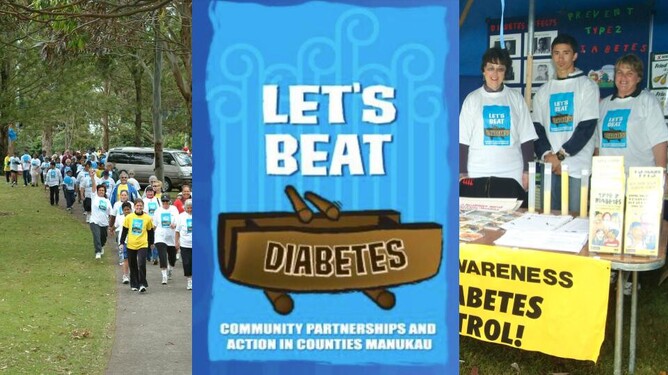Who can believe it...it's 15 years since the Lets Beat Diabetes 5 year plan was put into action. Lets Beat Diabetes (LBD) was a very ambitious project put together by Counties Manukau District Health Board (CMDHB), as it was back then. There's more information on the original planning from a document here and a 2007 workshop information sharing document here. The project was described as "Let’s Beat Diabetes, commissioned by Counties Manukau District Health Board (CMDHB), is a five year plan aimed at long-term structural changes to prevent and/or delay the onset of diabetes, slow disease progression, and increase the quality of life for people with diabetes. It recognises the significant activity that already exists to prevent and manage diabetes, and creates a long-term vision to align existing activity and a context for new investment, based on evidence and best practice".
For Diabetes Foundation Aotearoa (Diabetes Projects Trust back then), this was a really exciting opportunity to come together with the DHB, other organisations and the community inside a coherent structure. There were up to the minute theories being applied, active engagement of the community, planned use of tools such as social marketing and resource was provided for co-ordination and management of the project. We met many interesting people and had the opportunity to network and collaborate, we carried out joint activities and overall it was an exciting and productive time.
Lets Beat Diabetes came to an end (2007 benchmark survey document here), however as an organisation we are proud to say that some of it's activity has continued in some of the programmes and services we offer. In particular, the pilot programme of community gardening came to us for re-development for roll-out and ongoing sustainability and is still thriving as our Gardens4Health. A pilot programme run in a Mangere venue demonstrating healthy eating came under our umbrella to be developed into an Auckland wide model with train-the-trainer capability. We also maintain contacts today from our involvement in various groups and advisory roles during the project, and have occasion to revisit or share reports, including a review of all written resources with recommendations, and various evaluations of aspects of activity that we were commissioned to carry out.
So thanks Lets Beat Diabetes. Gone but not forgotten!


